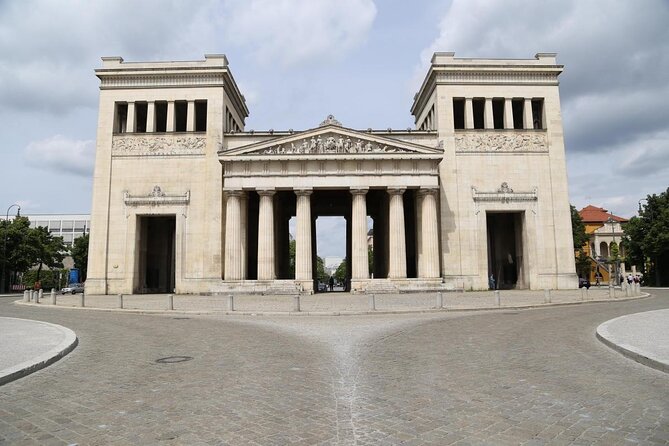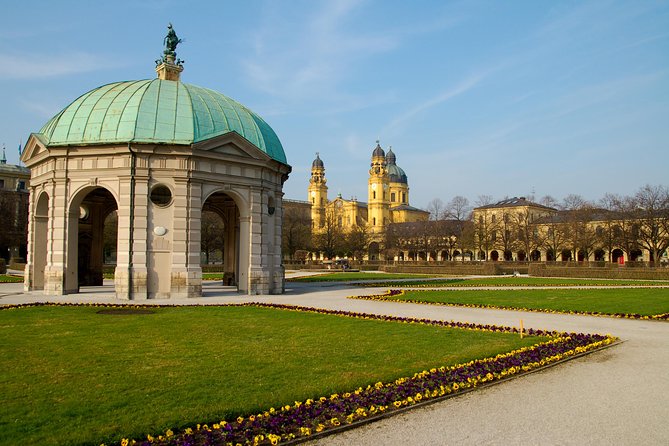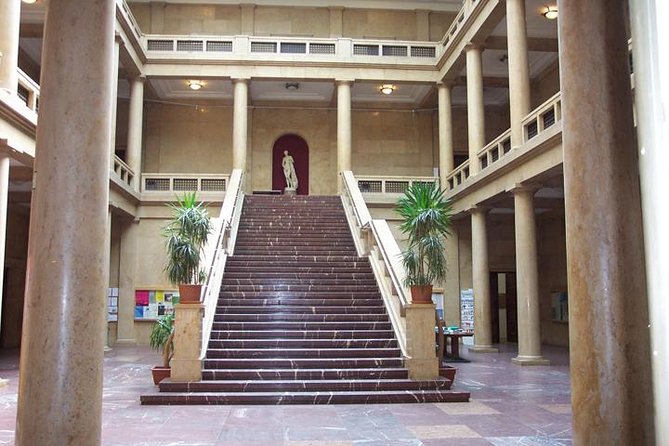Munich’s dark past as the epicenter of the Nazi movement is a haunting chapter in history that continues to captivate and educate visitors to this day. A 2.5-hour walking tour through the city’s key sites like the Königsplatz and Feldherrnhalle sheds light on this complex and troubling era, offering a balanced perspective that humanizes the horrors of the Third Reich. By exploring the stories of both perpetrators and resistance fighters, this tour serves as a sobering reminder of the consequences of unchecked extremism and the importance of safeguarding democratic values. For those seeking a deeper understanding of Munich’s integral role in the rise and fall of the Nazi regime, this walking tour provides a profound and thought-provoking experience.
Key Points

- The tour covers Munich’s crucial role as the epicenter of the Nazi party, with visits to iconic sites like Königsplatz and Feldherrnhalle.
- Participants learn about the White Rose resistance movement and its efforts to oppose the Nazi regime, including the story of Hans and Sophie Scholl.
- The tour provides a balanced approach, exploring both the rise of the Nazi party and the resistance efforts that emerged in Munich.
- With a small group size, the tour offers a personalized experience and allows for in-depth discussions about Munich’s dark history during the Nazi era.
- The tour serves as a sobering reminder of the dangers of unchecked extremism and the importance of vigilance in safeguarding democratic ideals.
Tour Overview

The 2.5-hour walking tour aims to uncover the dark side of Munich’s history during the Nazi era. Participants can expect to learn how Munich served as an important center for the Nazi Party, hear stories of Hitler’s rallies and the White Rose resistance movement, and visit key historic sites in a small-group setting limited to 10 people for a personalized experience.
The tour covers iconic locations like Königsplatz, Feldherrnhalle, Hofgarten, and the Hofbräuhaus beer hall. Guests will also see Hitler’s former headquarters, gaining a deeper understanding of Munich’s pivotal role in the rise and fall of the Third Reich.
The tour provides a comprehensive and immersive look at this complex and challenging period of history.
If you're enjoying exploring Munich on foot, you'll love these other walking tours we recommend
Key Sites Visited
Königsplatz serves as the starting point for the tour, where participants can learn about this significant Nazi-era square and its role in the party’s rallies. Feldherrnhalle, a historic monument, holds stories of the failed 1923 Beer Hall Putsch led by Hitler. The tranquil Hofgarten, in contrast, provides a respite from the darker historical narrative, though even this verdant space was not immune to the party’s influence. Iconic Hofbräuhaus beer hall, a longtime hangout for the Nazis, offers a glimpse into their social gatherings and propaganda efforts. Finally, the tour concludes at Hitler’s former headquarters, shedding light on the epicenter of the Third Reich’s power in Munich.
| Key Sites Visited | Historical Significance |
|---|---|
| Königsplatz | Nazi party rallies |
| Feldherrnhalle | 1923 Beer Hall Putsch |
| Hofbräuhaus | Nazi social gatherings and propaganda |
Meeting and Pickup

Travelers meet for the tour at the front of the Tourist Information of the City of Munich in Marienplatz, with the tour concluding at Königsplatz 1.
The meeting point is conveniently located in the heart of Munich, allowing easy access to the tour’s starting point.
From there, the group sets off on a 2.5-hour walking journey to uncover the dark history of the Nazi era in Munich.
The tour is wheelchair accessible and close to public transportation, ensuring it’s inclusive and accessible for all participants.
With a small group size limited to 10 people, the experience provides a personalized and intimate exploration of this significant historical period.
Inclusions and Accessibility
This walking tour includes a professional guide to lead participants through the historic sites and share the stories of Munich’s dark past.
It’s also wheelchair accessible and situated near public transportation, ensuring an inclusive experience for all travelers.
The tour provides an in-depth exploration of the city’s role during the Nazi era, covering key sites like the Königsplatz, Feldherrnhalle, and Hitler’s former headquarters.
With a small group limited to 10 people, the tour offers a personalized experience, allowing participants to engage with the guide and gain a deeper understanding of this pivotal chapter in Munich’s history.
Reviews
Reviewers have praised the walking tour’s ability to provide a comprehensive and engaging exploration of Munich’s dark history during the Nazi era. Guests appreciate the small group size, which allows for a personalized experience and the opportunity to ask questions.
The guide’s deep knowledge and ability to bring historical events to life through captivating storytelling.
The tour’s balanced approach, covering both the rise of the Nazi party and the courageous resistance movements that emerged.
The tour’s efficient pacing, striking the right balance between information-packed stops and allowing time for reflection.
Fascinated by Munich's past? More historical tours we've covered
- City Walk + English Garden and Colorful History + Culture in the City Center
- Munich: Historical Walking Tour on the Rise of Hitler
- Munich: Resistance Against Hitler – Historical Walking Tour
- Private Salzburg History & Food Tour With Munich Train Add-On
- Bayern Munich Tour (City, Land, Bazaar, Historical, Taste)
- Private Munich Old Town & Historical City Tour
Munich’s Role in the Nazi Party
Munich’s centrality to the Nazi Party’s rise to power cannot be overstated. The city served as the organization’s spiritual and strategic headquarters, hosting the party’s earliest rallies and providing a fertile ground for the dissemination of its extremist ideology. Key sites that demonstrate Munich’s pivotal role include:
| Site | Significance |
|---|---|
| Königsplatz | Site of massive Nazi rallies and parades |
| Feldherrnhalle | Location of the 1923 Beer Hall Putsch, a failed attempt to seize power |
| Hofgarten | Home to the White Rose resistance movement, which actively opposed the Nazi regime |
These locations offer a window into the city’s dark past, showcasing how Munich’s influence and Nazi sympathies fueled the party’s ascent to power and its subsequent reign of terror.
Hitler’s Rallies and Resistance
Hitler’s rise to power was fueled by his ability to captivate massive crowds through his impassioned speeches at rallies in Munich. Although the Nazi regime exerted its control through fear and violence, an underground resistance movement known as the White Rose fiercely opposed the party’s extremist ideology.
The group’s members, including siblings Hans and Sophie Scholl, risked their lives to distribute anti-Nazi leaflets and call for passive resistance.
Hitler’s rallies at venues like the Königsplatz and Odeonsplatz drew thousands of supporters who were mesmerized by his charismatic delivery and nationalist rhetoric.
The White Rose movement, formed by students at the University of Munich, published and distributed six anti-Nazi leaflets that exposed the regime’s atrocities.
Hans and Sophie Scholl were executed in 1943 for their role in the White Rose, but their legacy as courageous symbols of resistance lives on.
Significance of the Tour
The walking tour offers visitors a chance to explore Munich’s chilling past as a stronghold of the Nazi Party, shedding light on the city’s integral role in Hitler’s rise to power.
By visiting key sites like the Königsplatz, Feldherrnhalle, and Hitler’s former headquarters, travelers gain a deeper understanding of how Munich became the epicenter of the Nazi movement.
Through first-hand accounts and historical narratives, the tour humanizes the horrors of the Third Reich, giving voice to both the perpetrators and the resistance fighters who dared to challenge the regime.
Ultimately, this immersive experience serves as a sobering reminder of the dangers of unchecked extremism and the importance of vigilance in safeguarding democratic ideals.
Frequently Asked Questions
How Much of the Tour Is Spent Outdoors?
The majority of the tour is spent outdoors, as it covers several key historical sites throughout Munich. Approximately 2 to 2.5 hours of the 2.5-hour tour take place outside, with stops at locations such as Königsplatz and Feldherrnhalle.
Can I Purchase Food or Drinks During the Tour?
During the tour, guests can purchase food and drinks at the iconic Hofbräuhaus beer hall, which is one of the key sites visited. The tour itself does not include any food or beverage options.
Do I Need to Bring My Own Audio Device?
No, you don’t need to bring your own audio device. The tour provides headphones so you can clearly hear the guide’s commentary throughout the walking tour. This ensures you don’t miss any important historical details.
Is There a Dress Code for the Tour?
There is no specific dress code for the tour. Participants are advised to dress comfortably and wear appropriate clothing for the weather, as the tour involves walking. The tour is designed to be accessible to all.
Can I Take Photos During the Tour?
Participants are generally allowed to take photos during the tour, though the guide may request that photos not be taken at certain sensitive sites. It’s best to check with the tour operator for any specific photography guidelines.
Recap
This walking tour of Munich’s Nazi-era landmarks provides a sobering look into the city’s integral role in the rise of the Third Reich.
By exploring key sites and hearing the stories of both perpetrators and resistors, participants gain a deeper understanding of the dangers of unchecked extremism and the importance of upholding democratic principles.
The tour serves as a powerful reminder to learn from history and work towards a more just, equitable future.
More Walking Tours in Munich
- Munich Private Guided Walking Tour with Deutsche Museum
- Munich: Walking tour of the old town with all your senses
- Munich: Private Walking Tour Through Munichs Heart
- Munich: Private Walking Tour with good laughs and much info
- Munich: City Highlights and Beer Garden Walking Tour
- Private Munich Old Town and Historical City Walking Tour
More Tours in Munich
- Munich: Mini Classic Bike Tour with Beer Garden Stop at 4 PM
- National Socialism WWII with licensed guide – private tour
- Munich: Dachau Concentration Camp Private Tour by Car
- Munich: Residenz Museum Tickets and 2,5-hour Guided Tour
- Munich and Nazi History Combination Day Tour Small Group
- Private Munich Bike Tour with Beer Garden Lunch Break
More Tour Reviews in Munich
- Munich: Raven Black Witches and Executioners Walking Tour
- Munich: Night PubCrawl Shots and Party!
- Munich: Phototour – Your guide to beautiful photo spots
- Munich: Private or Group Third Reich and WWII Walking Tour
- Munich: Classic Guided City Tour by Bike (English Tour Only)
- Oktoberfest Tour: All in!!! Table reservation with 2 tickets for rides
Not for you? Here's more things to do in Munich we have recnetly reviewed
- Munich: Old Town Highlights Private City Tour – Walking Tour
- Munich Residenz: Master Concert in the Hercules Hall
- Munich: Private Walking Tour Munich Highlights
- Munich: River Surfing in MunichSurfing all you need to know
- Munich: Adventurous Bachelor Party Surf Experience – Munich
- Munich: Private Tour with a Local Guide
- Munich: Highlights Walking Tour with a Guide
- Munich Specials (choose!): OldTown, Dachau, 10Tastes, Spooky
- Munich: Wheelchair Rickshaw Tour through the English Garden
- Third Reich: Art, Cult and Ideology behind the tragedy
- Munich: Private Highlights Tour by Car – Private Tour Guide
- Secret Food Tours Munich
